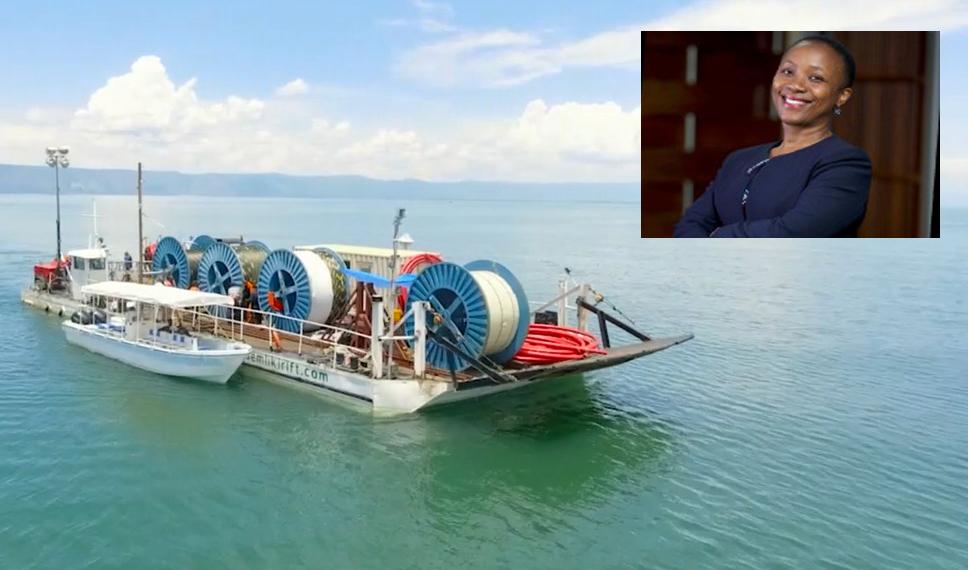Telecom infrastructure provider BCS brings female role models into a male-dominated sector
During the investment process, Finnfund always discusses how a company can support women as employees, managers and customers. We especially examine structures that enable the equal engagement of women. Our recent investee Bandwidth and Cloud Services Group (BCS) is a telecom infrastructure provider operating in several African countries. We got impressed by BCS’s track record of empowering women for higher positions. The company has women in leadership positions as well as policies in place to empower women in workforce. As the telecom industry tends to be very male dominated, we wanted to know more about BCS’s approach.
“BCS has always been very intentional about women’s empowerment” says the company’s Group Marketing & Impact Manager June Delfaud. “Women represent over 37% of our staff and currently, we have 45% women in both senior and middle management.” That’s impressive numbers in any industry, let alone the one they operate in. How is this possible?
“The key for us is training and supporting women”, says Delfaud. In many of the countries BCS operates in there is a strong will to get more women to study STEM (Science, Technology Engineering, and Mathematics). BCS participates in this by offering both female role models as well as trainee positions for women especially. “We want to make sure that young girls can look at BCS and see that engineering can be my job. We want to give them confidence”, says Delfaud.

“The level of autonomy and empowerment allowed by BCS allows one to innovate and push for excellence and deliver without constraint. I also love that my role takes me to places I would not otherwise have taken myself.
The BCS opportunity has given me a renewed sense of self-belief in what I am able to do and achieve,” says Susan M’kandawire, Chief Regulatory Officer.
Read more about Susan’s and her colleagues’ thoughts about empowering women >>
Growing and expanding, BCS has kept focusing on women
The strive for equality has been in BCS’s DNA ever since the company started 10 years ago in Uganda. “Already the first strategy had women involved”, Delfaud says. “We had female managers from the start and now that we have grown from 10 to nearly 100 in staff, the female leadership has stayed as a value.”
BCS has its headquarters in Nairobi, Kenya, but has in recent years been expanding to countries such as the Democratic Republic of Congo where women’s employment is on a low level, not to mention the possibility to advance into higher positions. Currently, DRC is at second last place in UN Gender inequality index. June Delfaud herself has worked in DRC the past years. “We are a small team of ten, out of which 3 are women. We are trying hard to find more women to join BCS, but it is difficult since not all girls go to school and most women are not working outside their homes”, she says.
Room for growth and flexible ways of working
Delfaud joined BCS as a consultant to look after the supply chain in finance, but advanced into her current position because of the company’s strong support. “My story is a true story of when you are actually a bit insecure about yourself but still being given responsibilities that challenge you”, she explains. “I was encouraged to professional development and got all the support I needed. Today, I’m part of the BCS family and responsible for social impact, marketing and PR.” Delfaud laughs when she says that she wasn’t really that interested in technology and still isn’t the most tech-savvy person in the company. “When I joined BCS, I didn’t know anything about fibre. But you can learn a lot in this company – now I can discuss fibre infrastructure on a professional level”, she says.
Having a baby 8 months ago didn’t slow down Delfaud’s career. BCS has procedures in place to ensure that mothers-to-be and mothers with small babies get all the support they need and find a flexible way of working. “The company offers 6 months maternity leave, which is not that common”, Delfaud says. “Personally, I wanted to be in the loop of things and kept contact with work during my maternity leave”, she says. When she returned to work, she worked part-time and has never experienced her need for flexibility an issue. “The message from the company is that your family should be your number one priority. Your job is of course important, but it’s still just a job.”
Encouraged to take on a big challenge
Grace Irungu is a Project Engineer that just completed a project related to BCS’s Lake Tanganiyka submarine cable which, once completed, will provide broadband connectivity to eastern DRC. “It’s the deepest lake in East Africa and a very harsh environment for a project like this”, she says. “The size of this project was something we have never done before and required lots of high-tech equipment. Leading this was my biggest and most complex project so far”, she says.
Irungu has been with BCS for three years. She started as a graduate trainee in the technical department and moved on to work as a project engineer. “I’m a young woman but being given this kind of an opportunity just shows how BCS wants to see you grow”, she says. “Having other women as mentors and role models has been crucial for my success and I’ve always felt that I have all the support I need.” She admits that it feels good to show that women can do what she’s doing – especially in a country like DRC.
Both Delfaud and Irungu keep coming back to the words encouragement and support – and family. Mentorships and pairing up people from different positions are key for helping people learn from another. Staff members can also get further education while BCS covers the tuition fees.

The women of BCS send a message
BCS really holds on to their talent and provides mentoring and guidance. It’s of course clever to train your employees to be the best they can be, but June Delfaud talks about more than business values. “We are committed to making a positive social impact. We want to make sure that we send the right kind of messages to young girls”, she says.
People may have prejudices against women in leadership positions or technical roles, and it’s certainly not easy to be sometimes the only woman in the team. Delfaud knows that women need to think about how they act in different situations. “Women still have to prove themselves”, she says. Sometimes, when a woman enters the room in the role of an engineer or as the project manager, people get surprised. “We do like to send a message to all our stakeholders as well”, Delfaud continues. “We are very proud of our staff, not least the women.”
Empowering girls and women is at the core of BCS’s purpose
Through public-private partnerships, BCS is connecting schools and hospitals in DRC. There are also plans for school collaborations where BCS would support local schools with both buildings and equipment as well as promoting IT as a career option. “We already do this in Uganda with good results”, Delfaud says. “In Kenya, we have donated laptops to our partner schools, but increasing our social impact means that we must be able to do more.”
Expanding into DRC is a big part of BCS’s journey. “The level of poverty in the country needs to change”, Delfaud says. “Today, information is power and giving the people of DRC access to it through internet means advancing inclusion in many ways. Showing girls and women that they can get an education and have a career is something we want to do.” At BCS, there is a greater purpose behind the business. “We see IT and connectivity as tools to building a better society.”
More information